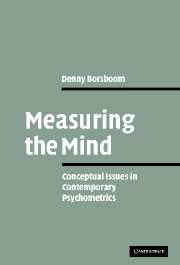5 - Relations between the models
Published online by Cambridge University Press: 22 September 2009
Summary
Three umpires are discussing their mode of operation and defending their integrity as umpires. ‘I call 'em as I see 'em,’ said the first. The second replied, ‘I call 'em as they are.’ The third said, ‘What I call 'em makes 'em what they are.’
R. L. Ebel, 1956Introduction
The choice between different mathematical models for psychological measurement, of which this book has discussed three types, involves both an ontological commitment and a position concerning what one regards as measurement. The true score model is operationalist: it views any observed test score as a measure of a true score, where the true score is exhaustively defined in terms of the test score. The representationalist model is constructivist, but not operationalist. It views scales as constructed representations of the data, but it is highly restrictive in the kind of representation that counts as a measurement scale. The meaning of scales does not explicitly derive from a realist ontology regarding attributes, but neither is it defined in terms of a specific measurement procedure in the way the true score is. Latent variable models introduce an a priori hypothesis concerning the existence of theoretical entities. The latent variable model does not work its way up from the data, like representationalism, but posits an explanatory account of where the relations in the data came from.
- Type
- Chapter
- Information
- Measuring the MindConceptual Issues in Contemporary Psychometrics, pp. 121 - 148Publisher: Cambridge University PressPrint publication year: 2005



